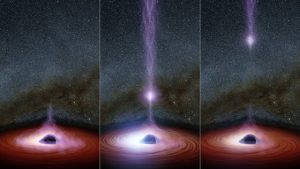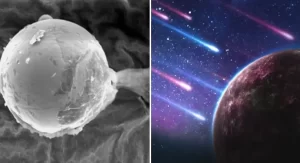The Trans-en-Provence UFO Encounter: Strange Saucer-Shaped Craft That Landed In Renato Niccolai’s Yard

The Trans-en-Provence incident is a strange case where an unidentified flying object left a scorched residue in a local resident’s backyard. On January 8th, 1981, this incident took place in the French village of Trans-en-Provence, where an elderly man who was nearly illiterate reported seeing a U̳F̳O̳ land in his garden. A famous magazine of science and technology named Popular Mechanics describes the case as “perhaps the most completely and carefully documented sighting of all time.”

The incident took place when , a 55-year-old farmer Renato Niccolai, was doing his agricultural work on January 8, 1981, at 5 pm on his property. Suddenly, he heard a whistling sound and when he looked up, he spotted a U̳F̳O̳ about 2.5 m in diameter above two pine trees at some distance from his field. Fearing the U̳F̳O̳, he ran and hid himself in a cabin on a hill above his house, and watched the U̳F̳O̳ from a distance of 250 meters land in his fields.
“The ship was in the form of two saucers upside down, one against the other. It must have been about 1.5 meters high. It was the colour of lead. The ship had a border or a type of brace around its circumference.”
As a few moments passed, the U̳F̳O̳ rose to the height of a pine tree and shot away in the northeast direction after making a whistling sound.
“Underneath the brace, I saw, as it took off, two kinds of round pieces which could have been landing gear or feet. There were also two circles which looked kind of like trap doors. The two feet or landing gear extended about 20 centimetres beneath the body of the whole ship.”
He then went inside his home to tell his wife, who initially thought that he was joking, but when they visited the site where the U̳F̳O̳ landed, they saw marks of the U̳F̳O̳. Nicolai, being illiterate, thought the U̳F̳O̳ was some sort of military device developed by the French military. He was unsure of what to do next, so he sought assistance from his neighbor’s wife, Mrs. Morin, who advised him to report the incident to the gendarmerie.

Analysis of Evidence
The Gendarmerie arrived the next day after the incident.
“We observed the presence of two concentric circles, one 2.2 meters in diameter and the other 2.4 meters in diameter. The two circles form a sort of corona 10 centimetres thick, one within the other. There are two parts clearly visible, and they also show black striations.”

The gendarmerie continued with their investigation, interviewing the farmer and collecting soil samples from the two circle marks left on the ground. On the twelfth, the case was sent to the Group d’Etude des Phénomènes Aérospatiaux Non-Identifiés (GEPAN), ғʀᴀɴᴄᴇ’s official U̳F̳O̳-investigation agency, which has since 1988 become the Service d’Expertise des Phènomènes de Rentrées Atmosphériques (SEPRA).
The next month, the traces on the site were still there when GEPAN made site visits. After the investigation, it was concluded by the GEPAN that the farmer was telling the truth. Later, Michel Bounias, a botanist at the National Institute of Agronomy Research, received soil and alfalfa (a plant that was growing at the landing site) samples. The Universities of Metz and Toulouse also took part in some of the research. Over the next two years, Bounias undertook extensive research.
(1) The chlorophyll pigment in the leaf samples was weakened from 30 to 50 percent.
2) The young leaves “withstood the most serious losses, evolving tow̳a̳r̳d the content and composition more characteristic of old leaves.”
(3) There was evidence, GEPAN reported, of the “occurrence of an important event that brought with it deformations of the terrain caused by mass, mechanics, a heating effect and perhaps certain transformations and deposits of trace minerals (phosphate and zinc). We cannot give a precise and unique interpretation to this remarkable combination of results. We can state that there is, nonetheless, confirmation of a very significant event which happened on this spot.”
“The effects on plants in the area can be compared with that produced on the leaves of other plant species after exposing the seeds to gamma radiation. Data show that a considerable amount of gamma radiation (10 to the sixth power rads) must be applied to produce a disturbance equivalent to that observed at the site. Should we consider the presence of ironizing (nuclear) radiation? Almost certainly not, since no measurable residual radioactivity is present in plants. However, could the trauma be caused by an electromagnetic field? probably”
In an interview with the magazine ғʀᴀɴᴄᴇ-Soir in 1983, Valesco said that the investigation showed that the thing that landed on Niccolai’s property weighed between four and five tons.
Skeptics On Trans-en-Provence I̳n̳c̳i̳d̳e̳n̳t̳
French investigators who are skeptical have said that GEPAN and Bounias are “true believers” who want to prove that a̳l̳i̳e̳n̳s have visited Earth and keep GEPAN’s funding going. Eric Maillot and Jacques Scornaux used the work of an anonymous Belgian plant pathologist who was able to show that Bounias’ work had a lot of holes and mistakes.
The expert concluded that a significant amount of effort had been expended in vain and that the results were inconclusive. French scientists thought that the GEPAN investigation was flawed, especially the study of the physical traces.




